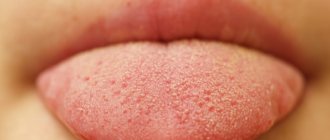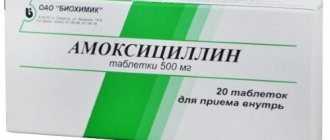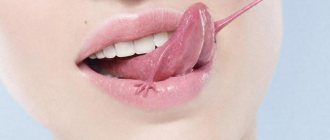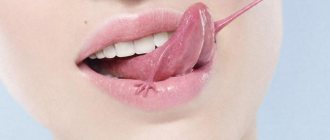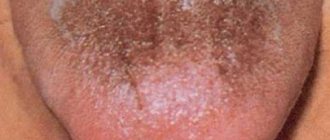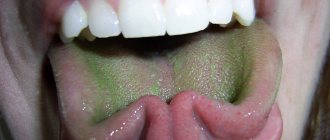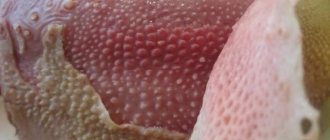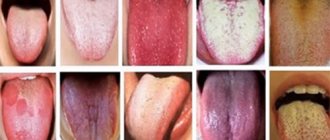September 17, 2018
The brown color in nature is very symbolic; it represents the primitive life force coming from the warm earth, the ancestor of all beginnings. But a person who chooses this shade is characterized as insecure and tired, in need of peace and relaxation, deprived of good health. But this color can appear not only in this way; for example, some may notice a brown coating on the tongue. What is this? This is undoubtedly a reason to be wary. And we’ll tell you why this needs to be done in an article prepared by the editors of the UltraSmile.ru portal.
Why does a brown coating appear on the tongue?
Fact No. 1: if you managed to quickly get rid of plaque, then there is no reason to worry
Are you finding out why your tongue has acquired a brown coating or some other color? Check whether this tint is the result of exposure to certain drinks and foods, a consequence of their frequent or recent consumption. Because if this is really the case, then there is no reason to panic. Plaque caused by drinking coffee, tea, chocolate and other products rich in tannins and brown dyes can be easily removed during a standard procedure using a regular toothbrush with toothpaste, irrigator, and rinse.
Do not forget one more important feature: a brown coating on the tongue, when excluding food dyes, diseases and pathologies, almost always indicates active smokers. At the same time, not only the tongue, but also the mucous membranes and even the teeth are painted in this unpleasant color.
If the plaque is easily washed off, then there is no reason to worry
A characteristic color also occurs in those patients who have undergone drug therapy for a long time, in particular, they have used certain groups of drugs (Faringosept, antibiotics, Malavit, medications with bismuth) - they affected the course of metabolic processes in the body and led to such an unpleasant result. This is a reason to cancel such medications. And for smokers, such a symptom is another excellent proof that it’s time to quit smoking, otherwise it’s easy to lose all your teeth as a result of periodontitis or periodontal disease.
Tongue piercing
In some cases, pigmentation disappears in the tongue piercing area, leaving only dark-colored spots. They can occur not only due to bleeding that occurs during the puncture, but due to the presence of jewelry in the oral cavity.
If an infection occurs during the piercing, it should be treated in a timely manner. In addition, it is important to perform all necessary postoperative manipulations and use only gold or titanium jewelry, as they are the least allergenic.
Fact No. 2: brown color is one of the signs of problems with internal organs
A brown coating on the tongue in adults or children has different causes, but almost always indicates that at least one of your internal organs has become infected. And, with a greater degree of probability, of all possible cases, the problem is localized in the intestines or stomach1.
Important!
The surface of the tongue is covered with microscopic papillae, which are actively involved in determining various taste sensations.
On top, the papillae are protected by a thin epithelium, which, with good immunity, constantly dies and is renewed. If disturbances are detected in the body, the epithelium becomes denser and ceases to renew itself. And given that the smallest particles of food and plaque periodically settle on it, the mucous membrane becomes the best and most convenient environment for the proliferation of bacteria. The tongue is a kind of mirror of the body. It can consider even the earliest and first signs of infectious and non-infectious diseases. It is also a muscular organ and a kind of receptor that transmits signals to other organs, in particular to the digestive tract, as a result of which metabolic processes are launched in it and enzymes are produced. If the stomach or intestines are sick, then the exact opposite reaction occurs, nerve signals go from them to our tongue. He, trying to protect himself from troubles, reacts in this way: a brown coating appears.
Stomach diseases can cause tongue problems
So, why does a brown coating appear on the tongue? Check for the presence of gastritis, ulcers, dysbacteriosis, inflammation in the intestines (the large or small intestine, duodenum may suffer), hepatitis or cholecystitis, diseases of the biliary tract.
However, a brown coating on the tongue is not always due to stomach problems. The reasons are varied: dehydration, oral candidiasis (thrush), food poisoning, violation of the regime or technique of oral hygiene procedures, dental diseases and problems, pulmonary failure, vitamin deficiency (in particular, we are talking about vitamins B3 or PP), diseases hematopoietic system (anemia or hemolysis), problems with the adrenal glands, stomatitis and even the immunodeficiency virus.
Oral fibroma
Fibroma is a benign tumor that has the shape of a polyp or dome, that is, it is a formation that resembles a hard, smooth round lump, which with its base or stem is attached to the tissues of the oral cavity. They look like moles and freckles and may have a dark color. Fibroma can occur for various reasons, for example, due to irritation caused by exposure to dental devices, piercings, and teeth.
Therapy for such a tumor can only be surgical; however, surgery does not guarantee that the tumor will not reappear in the same place. Treatment should not be neglected, since fibroids can multiply and grow. In addition, you should avoid damaging the tongue, particularly in the area where the fibroid was previously located. Trauma can trigger its growth again.
Fact No. 3: shade indicates different pathologies
For example, dark brown plaque indicates that the disease is in an advanced stage (liver, pancreas, gall bladder), and the body in this case needs strong therapeutic support. An adult or child who has a brown coating on the tongue may experience soreness, bitterness in the mouth, nausea and vomiting, and pain in the hypochondrium.
Brown coating on the tongue can also be light, then the cause should be sought in problems with the respiratory system or joints. Light-colored plaque is typical for asthmatics and those who suffer from pneumonia and bronchial inflammation.
“One morning I noticed in the mirror while getting ready for work that my entire tongue was brown in my mouth. To be honest, I was very scared, I tried scrubbing with a brush and even an irrigator and a special nozzle to clean it, but it didn’t help. Then I made an appointment with my local therapist, and after blood tests he sent me to a gastroenterologist. It turned out that I have fibrous gastritis. And before that, about a year ago, I suffered from scarlet fever, and these were the sad consequences it had. It’s scary, it’s offensive, but there’s nowhere to go - I’m getting treatment now and I’m glad that I went to the appointment on time and didn’t read on the Internet how to deal with it on my own, although I was tempted.”
Alena, 33 years old, Krasnoyarsk region, review from the website woman.ru.
Different shades of color indicate different pathologies.
A yellowish-brown tongue may indicate causes such as alcoholism and liver hepatosis. Often it also indicates poisoning by chemical, synthetic or toxic substances. A similar situation is often observed among drug addicts, but ordinary people with gastritis and stomach ulcers can also find a similar color.
If the color of your brown tongue is also mixed with a green tint, then this is a reason to adjust your diet, enriching it with vitamins, eliminating fatty foods and all sorts of harmful things, and stopping treatment with antibiotics, if they occur. Well, get checked for fungal infections of the oral cavity to rule out stomatitis or candidiasis.
Oral cancer
Tongue melanoma is a less common type of oral cancer. Brown spots on the tongue caused by oral cancer are extremely rare. You can assume the occurrence of cancer if its appearance is accompanied by other symptoms - difficulty moving the jaw when speaking, swallowing, bleeding wounds on the face, neck, mouth, hoarseness, chronic soreness in the throat.
In this case, you should not give in to panic; cancerous tumors can be treated with chemical medications, radiation, which destroys carcinogenic cells, as well as through surgery aimed at removing the tumor.
Fact No. 4: the type and structure of plaque matters
Agree, when there is a brown coating on your tongue, it is not a pleasant sight. However, if, for example, it is still very thin, then you have every chance to get rid of the disease quickly and even brush it off with an ordinary toothbrush. But if it is dense in structure and consistency and cannot be removed even with a special scraper, then it’s time to run to a specialist, since chronic stages of diseases rarely respond to conservative therapy, and minutes can already count.
Important!
A light brown or white coating on the tongue in the morning, after sleep, is a completely normal phenomenon, indicating that during sleep, dead epithelial cells could not be removed naturally: without oral hygiene or mechanical cleaning with food.
If they come off easily during your morning brushing, then there is no cause for concern. Do you regularly find a brown coating on your tongue in the morning? Carefully observe its appearance, color, density and consistency:
- if it is dry: this is evidence that the problem should be sought in a malfunction of the salivary glands,
- if the bacterial film is wet: this is a clear sign of vitamin deficiency or thyroid disease.
Dense and hard plaque is a reason to consult a doctor.
Also pay attention to where the problem is visible. It can be localized in the very center of the tongue, which is responsible for the cardiovascular system, at the root - here is the area of influence of the digestive tract, at the tip - the sphere of the respiratory tract. In any case, if the problem bothers you for more than three days in a row, this is a serious reason to contact a specialist who, with the help of a comprehensive examination of the body (blood and stool tests, ultrasound of internal organs, radiography, probing), will be able to explain why a brown coating appeared on the tongue .
Notice
: Undefined variable: post_id in
/home/c/ch75405/public_html/wp-content/themes/UltraSmile/single-item.php
on line
45 Notice
: Undefined variable: full in
/home/c/ch75405/public_html/wp-content /themes/UltraSmile/single-item.php
on line
46
Rate this article:
( 1 ratings, average: 5.00 out of 5)
language
- Sokolova O.A., Avanesov A.M. Changes in the oral mucosa in pathology of the gastrointestinal tract. Electronic scientific and educational bulletin “Health and education in the XXI century”, 2009.
Allergic manifestations and the result of exposure to certain medications
Certain chemicals, such as bismuth, can cause stains in the mouth. In addition, some medications that are allergens can cause tongue spotting.
To solve this problem, it is important to prevent contact with the allergen, take antihistamines, and continue therapy if the spots do not disappear.
Which doctor should you contact?
Few people know which specialist to contact if their tongue becomes stained. In fact, a whole group of doctors can help establish the cause of the disease and get rid of it: a dermatovenerologist, an ENT doctor, a surgeon, a dentist, a pulmonologist, a gastroenterologist and others. The first thing the patient should do is visit a therapist or dentist, who, if necessary, will refer him to a more specialized specialist.
Any pathology, be it small red dots or redness of the entire surface of the tongue, requires timely consultation with a competent doctor.
Your doctor will tell you how to treat various pathological conditions. The most difficult thing is to get an appointment with the right specialist and determine the problem, because treatment will be aimed not so much at eliminating the external defect, but at relieving the internal disease.
Therapy for some diseases may take only a few days, while for others it may take months or even years. The duration of treatment depends not only on the type of disease, but also on the degree of its neglect. That is why doctors recommend closely monitoring your health and not delaying a visit to a medical facility, even if the pathology seems insignificant. Don't ignore even a little redness.
Treatment of bleeding
What to do if bleeding comes from the tongue, and how to quickly stop it? First of all, it should be noted that treatment here will directly depend on the cause of the problem and the extent of the injury. To reduce bleeding and relieve pain, dental experts advise you to adhere to the following recommendations:
- first you need to thoroughly wash your hands and treat them with an antiseptic, for example, wipe them with alcohol or a special pharmaceutical solution. You can also use sterile gloves. The most important thing is not to allow infection to enter the open wound,
- after this, you should go to the mirror, tilt your head slightly forward to prevent blood from flowing down your throat and obstructing your breathing. It is imperative to remove all foreign objects from the oral cavity: chewing gum, piercings, dentures, if any,
- To stop the bleeding, you will have to put a little pressure on the organ. To do this, you will need a clean bandage, gauze or cotton wool, which must be applied to the damaged area. You need to keep the napkin in this position for at least 10 minutes. The tongue is characterized by an intense blood supply, so coping with the problem will not be difficult. After the specified time has passed, you need to remove the napkin and make sure that the blood has stopped flowing,
- After this, you need to rinse your mouth with cool water - cold causes blood vessels to constrict. Only after this can treatment be carried out with an antiseptic.
To stop bleeding, you need to cover the wound with a bandage.
If your tongue hurts a lot, try applying a piece of ice wrapped in sterile gauze to the wound. To alleviate the condition, you can take a painkiller tablet. If the wound is quite deep, be sure to go to the doctor.
Preventive actions
The surest way to avoid such trouble is to follow the following rules:
- proper cleaning of the oral cavity (morning and evening);
- regular visits to the dentist;
- physical activity;
- proper use of medications, especially antibiotics;
- hardening is required;
- healthy eating.
In most cases, staining does not pose a threat to human life. But in order to eliminate the risk of developing severe complications, it is best not to ignore the symptoms that appear, but to seek urgent medical help.
Set of measures
If there are spots on the tongue, treatment may include both the use of medicinal methods and traditional medicine.
Drug treatment will consist of drawing up a special diet for the patient, careful oral care (brushing teeth and tongue), and rinsing.
Your doctor may also prescribe antifungal medications and antibiotics.
Most often it includes the following steps:
- Thorough treatment of the affected areas of the tongue with antiseptic drugs.
- The use of antiviral drugs and, if necessary, antibiotics.
- Use of anti-inflammatory drugs.
- If the reason for the formation of spots lies in an allergic reaction, then it will be necessary to identify what caused such a reaction in the body (medicines or products).
- To prescribe effective treatment, a laboratory blood test for the Wasserman reaction is required.
- If the integrity of the fillings changes or the dentures or dental plates are deformed, you must seek help from a dentist.
For rinsing the mouth, the following are most often prescribed:
- Chlorhexidine;
- weak solution of manganese;
- furatsilin solution;
- herbal decoctions based on chamomile, calendula, sage.
The duration of drug treatment depends on the severity of the disease. If the disease lasts for a long time and in case of major complications, surgical intervention may be required. It is usually advisable to use it in case of blackening of the tongue.
Traditional methods of treatment involve the use of the following infusions and decoctions of medicinal plants:
- an infusion based on oregano, plantain and yarrow, this drink is drunk three times a day, 100 grams;
- jelly made from flax seeds;
- decoction for rinsing from oak bark;
- An excellent mouth rinse comes in the form of regular hydrogen peroxide.
